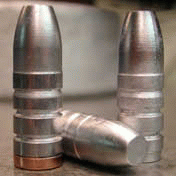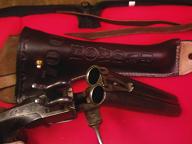

 The Accurate Reloading Forums
The Accurate Reloading Forums  THE ACCURATE RELOADING.COM FORUMS
THE ACCURATE RELOADING.COM FORUMS  Guns, Politics, Gunsmithing & Reloading
Guns, Politics, Gunsmithing & Reloading  Cast Bullets
Cast Bullets  which method of lube sizing is best???
which method of lube sizing is best???Go  | New  | Find  | Notify  | Tools  | Reply  |  |
| one of us |
I am new to casting and so far am really enjoying my new hobby. The question i have is what type of lube is best? I purchased the lee lube sizer with the liquid lube that you role around in a bowl, etc. Is this a good system or is this just a good way to get started? By the way i shoot a .44 mag and purchased the 310 and 250 gr gas check molds. | ||
|
Moderator |
greg, The folks using the star push through lube/sizer seem to think it's the best unit. I haven't had the coin to buy one, but did come up with a used lyman 450. Before that, I used the Lee push through sizer, and conventional lube smeared on with a finger, with the excess wiped off by the die. It is a slow and messy way to lube, but very effective. My 480 shoots more accurately then I do using the lyman 450, so I see no need to upgrade at this point. One advantage of the Lyman and RCBS is there is a large quantity of used size dies and top punches floating around at reasonable prices. For lube I use a homebrew of 50/50 beeswax and moly/lithium automotive grease. For commercial lubes, I like LBT blue and Appache Blue. | |||
|
| one of us |
greg p Nice to see Ya gettin' in to this castin' hobby so good! As far as sizin' goes, Square and fit to yer gun are what it's all about, and there are many paths that will get Ya there. LEE push thru sizers size em as square an easy as yer gonna get. If your mold throws boolits that just fit yer cylinder throats with a little pressure Ya can squirt some LEE liquid alox on em and load em without sizin' atall, if ya can drop em thru with no resistance they are to small, if they push hard size em to your gun's cylinder throat diamiter. I use the LEE's quite a bit Fer sizin' and seatin' gas checks prior to heat treatin' and then run em thru a lubesizer to lube em in a die .001" bigger than the LEE's. Everyone a us has our pet way's a usin' our home pours and results sure seem to be good for most. In lubsizers I got an RCBS, a couple of Lyman 450's and a old black Saeco. They all work real well but I use the RCBS the most. Just my preference. | |||
|
| one of us |
Thanks for the reply. My 310 grain cast bullets go through the sizer with a very slight amount of resistance. When i measure them they are perfect. I dont believe i could just load them without sizing first. After i size i lube them again with the same role around the bowl method and let them dry over night.This method is real simple for sure i was just concerned that it might not be a sufficient enough amount of lube. I am not big on recoil from a handgun and am looking for a light load for this bullet and the 250 grainer also. I hsve ordered the lyman cast book and am hoping for some good loads out of that. Greg | |||
|
| one of us |
Doublejk, i forgot to ask about the heat treating you mentioned. Can you tell me about this? Will the lyman book explain this, as to the why an what for? | |||
|
| one of us |
ive done it just about every way that its possible. I still use tumble lube for most of my .38 special bullets. If your going with a lube sizer do yourself a favor and save up for a star. You wont be sorry I have two lymans still on the bench and there not used much anymore. If i ever get around to getting star dies for my .500 and .475 they probably wont be used at all. The star is that much better. 3 times faster. | |||
|
| new member |
greg, You asked about heat treating. WITH WHAT -- straight wheelweights. Don't bother adding tin, it is not required or desirable. WHY -- I have gotten better accuracy and cleaner barrels with hard bullets like heat treated wheelweights or 50% lino. But it depends on the gun. Guns with good alignment and close tolerances may shoot fine with not-so-hard alloys (I have yet to own such a revolver). And your gas checks will help, too. HOW #1 -- drop the bullets from the mold into a 5 gallon pail of water. Not as hard or as consistent as method #2 described below, but it is easy and adequate for many applications. Note that heat treating only applies to wheelweights. Other alloys like linotype or Lyman #2 do not need and do not respond well to heat treating. HOW #2 -- Seat the gas checks and size the bullets, but don't apply lube. Then place in a pan & bake at 425� for one hour. Take out of the oven, carefully (cuz the bullets are butter soft) set the pan in the sink, and quickly pour a gallon of water on the bullets. Now apply lube and you're ready to go. FINAL NOTE -- the heat treating will wear off over time. Best case, it will last nearly 2 years with the oven treated wheelweights. Adding tin reduces the shelf life. Lower heat treat temperatures (like the bucket drop method) reduces the shelf life, too. | |||
|
| one of us |
Greg & MTN: The Lee sizers are certainly the way to go if you want to avoid purchasing an expensive lube-sizing machine with the associated dies and nose punches. Also, while wheel weights are plenty good for cast bullets, casting can be improved (better mould fill out, fewer rejects) by the addition of 1% tin (by weight); more than 1% is wasteful (and expensive). Moreover, not every gun, and this includes handguns, benefits from heat-treated bullets. Sometimes they're too hard to obturate (expand) and seal the bore effectively. WW's with or without added tin may be hard enough for your needs. Try say 50 rounds each way and then make a determination. Also, while the cold-water quenching method MTN discussed works, upon sizing the bullet, you actually soften it to a degree. On the other hand, it has the virtue of being fast and almost foolproof (Note: It works best if the CB's are very hot/frosted in appearance.) As for the oven method, if you want the hardest CB's (already sized), you have to get the oven hot enough so that a sample of CB's begins to melt and/or slump. You then reduce the oven temp. by 10 deg., put your CB's in a basket (which you make) and heat them for ~45 - 50min. For WW's, the temp. should be somewhere between 450 and 470 deg., depending on your oven. You then quickly remove the basket and its contents and immerse them in a pail or sink full of cold water. You don't dump the bullets from the basket into cold water. You then lube them per usual. Btw, Dennis Marshall has written about heat-treatment in Lyman and RCBS publications. Hope this helps, ...Maven | |||
|
one of us |
I tried several different lubes in my 454 and have pics posted at www.idahobronco.alloffroad.com/guns.html The shooting was done on a cold day around 0deg. I'll have to redo it on a warmer day and see if the results are similar. The best lube I tried was RCBS rifle. There was a very wide variance in accuracy, but it was very cold out. I may have to try some Lee liquid alox on the next outing just for comparison sake. | |||
|
| one of us |
greg p I only heat treat ifin' I have too, mostly fer my Marlin microgrooves. When yer riflin' don't grip very well, hard helps! | |||
|
| one of us |
I am confused as to why heat treating wears off in time. It don't wear off on a knife blade what gives? Cory | |||
|
| one of us |
quote:That's because knife blades aren't made of lead.. | |||
|
| Powered by Social Strata |
| Please Wait. Your request is being processed... |
|
 The Accurate Reloading Forums
The Accurate Reloading Forums  THE ACCURATE RELOADING.COM FORUMS
THE ACCURATE RELOADING.COM FORUMS  Guns, Politics, Gunsmithing & Reloading
Guns, Politics, Gunsmithing & Reloading  Cast Bullets
Cast Bullets  which method of lube sizing is best???
which method of lube sizing is best???

Visit our on-line store for AR Memorabilia

